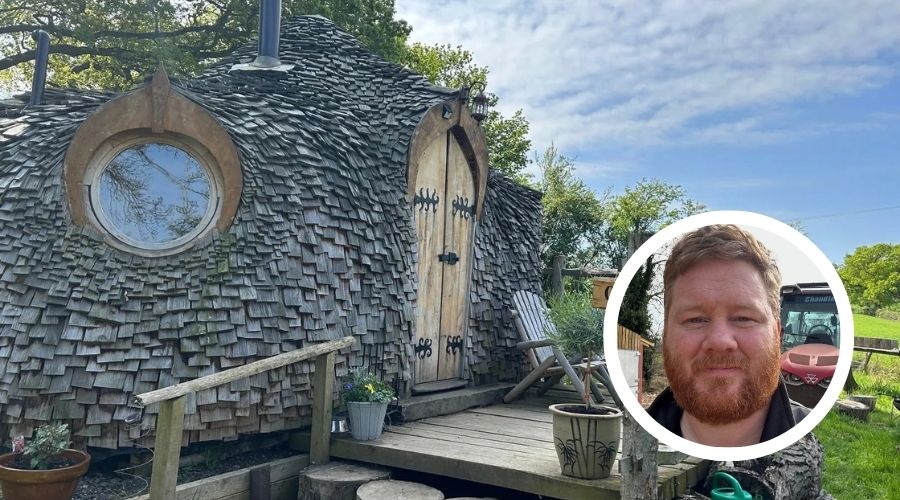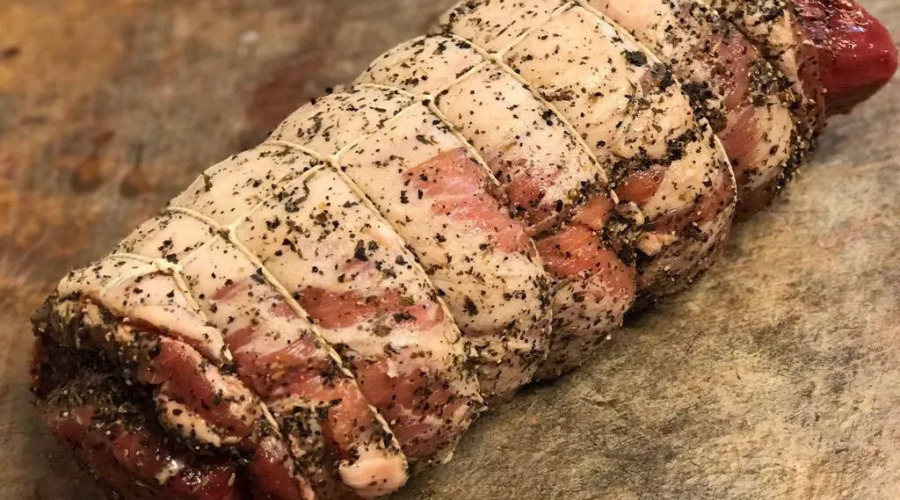“I’m always trying to think of the family”
11th July 2025
We spoke to farmer Ben Aveling on the Farmers Guide Podcast about the highs and lows of his diversifications over the past 20 years.

Having run farm shops, a pub, and most recently an eco lodge and online meat business, Ben Aveling is a realist about diversification – but remains a “sucker for a new idea”.
Radmore Farm in Towcester, Northamptonshire, was originally a large pig farm and they began selling their own pig meat and other produce in a farm shop in Cambridge city centre around 20 years ago – with their own on-farm butchery.
The farm shop was originally set up to give Ben’s wife and sister, whose parents own the farm, a foothold in the farming business.
From there, they bought a local pub, with the experience having much in common with Jeremy Clarkson’s purchase of The Farmer’s Dog, which features in the latest series of Clarkson’s Farm.
“We’ve been watching Clarkson’s Farm and it’s been quite funny because he’s following a very similar thing to what we did 10-15 years ago or more. Our local pub come up for sale and it was an absolute wreck, a bit like in the TV show,” Ben told the Farmers Guide Podcast.
“We tried to get it off the ground and over time opened a restaurant and sold our own produce through that.”
Listen to Ben’s insights on diversification:
Visit our podcast page to hear the full interview.
“We had to move on from the shop”
With livestock having fallen to quite a low level on the farm by 2018, their success with the farm shop allowed them to invest back into the farm, in the infrastructure for glamping, and building the livestock numbers back up.
Having moved premises, the farm shop closed when covid-19 restrictions eased and footfall dropped. They felt that glamping would help to spread their risk, with the first guest arriving at the eco lodge in June 2022.
“We got to the stage where we had to move on from the shop. So over time we managed to get through that and then about a year later I built a new website to try and plug the gap of the shop,” Ben explained.
“We deliver meats from our farm and buy some from local farms if we’re short. We now deliver it nationwide around the country and that’s actually going really well.”
Ben uses social media and YouTube to promote the online store, but doesn’t really ‘sell’.
“I don’t do that much pushing of products. I don’t really sell. I do the occasional advert maybe once a week or something just to tell people what’s on this week but actually what’s really interesting is by just being present and just doing farm videos I get far more orders than if I just did ‘order now’ videos.”
Deeply saddening profitability issues
Commenting on the profitability challenges facing farmers and the growing need to diversify, Ben said: “It’s deeply saddening first and foremost.
“I think the whole situation of farming is surrounded by a real narrative of doom and gloom and you’re told that you have to diversify and sometimes it’s true and sometimes it’s not.
“There’s a lot about diversification that I don’t like and that if I could change, I would.
“I would say that if farmers are being told they should diversify, in my opinion, it probably is more often than not by someone who has never diversified before.”

Taking time away from farming jobs
Ben spoke frankly of the downsides of diversification, particularly the time taken away from the farming business, and towards non-farming tasks.
“Doing the glamping is not even close to farming. No farmer wants to change beds and clean toilets and wash out the fridge.
“With the glamping it’s actually quite a lot of work and you’re welcoming people onto your farm who, not all the time but quite often, have no clue about the countryside and it can be quite stressful.”
He added: “One of the worst things about it is when you end up having to do the diversified job instead of a job that needs to be done on the farm and then you think to yourself, actually the farm’s suffering.”
Glamping has been the biggest culture shift, he explained, whereas the meat and farm shop businesses align more closely.
READ MORE: Farm opens gates to film crews for Brad Pitt’s latest F1 movie
READ MORE: Introducing… the Farmers Guide Podcast
READ MORE: Northamptonshire farm diversifies to put spotlight on endangered species
Investment challenges
Start-up costs are another issue and a barrier for many farmers, he noted. “The revenue streams, in my case with some of the diversifications I’ve done, you’ve never really made anything because of the heavy start-up investment.
“You can’t do anything without significant figures of money going into it in the first place and you’re lucky if you see your return in 10 years.”
He added: “If I could afford it, I’d diversify into most things. It’s just that it requires so much money. Most farmers aren’t in a position to actually do it. You’re told by the government, just set up a farm shop. Well, OK, how do you do that?”
“[…] You’ve really got to make sure that you can afford to do it in the first place, and ideally without having to borrow anything because that’s where it really kicks you in the teeth because obviously you’re paying money on money.”
There’s also a question mark over whether it’s best to invest that money into the farming business, or diversification – and there’s no easy answer.
“We have this question a lot where my father-in-law and I chat and we’ll say back in 2005, 2006, we might have been better off if we’d have put anything close to what we invested in diversification into efficiencies and equipment and things like this on the farm, and just trying to grow an extra 1 tonne/acre of corn.
“It’s one of those things where we’ll never know the answer to that, but sometimes it feels like we know the answer and it’s quite sad,” Ben said.
“But again we need to make sure that we are covering our possible losses by doing different things. And in all fairness, I quite like variety, so I don’t mind.”
It will always take more time than you think
For those considering a new diversification, Ben emphasised that it will always take more time than you think, so really think about what value it will bring to your business.
“I might have someone call up saying there’s a problem. I was going to go and do the worming, but now the sheep will just have to wait and at harvest time or haymaking time you have a very real time pressure, but you have to get your orders out for a certain day because people have ordered them.
“So the irony is to try and make your farm survive, you’re putting it last.
“Over time you get used to it and we’ve got systems in place but especially at first it’s hard.”
Dealing with the public for the first time is also a steep learning curve. “People can be quite happy to complain; we have Airbnb and you can get negative reviews which can really impact your rating.”
Choosing a business you like is key, Ben added, and if you outsource tasks you don’t like, it comes at massive cost – and staff will never do it like you do.
“That was something that happened with the shop. I thought by replacing myself in our shop over time, it would stay the same, but actually you don’t realise in a face-to-face business, for example, like a shop on your farm, people are actually coming to see you. If you’re not there two or three times in a row, they might just stop coming.”
Future generations
Despite the challenges, Ben says he’s a sucker for a new idea.
Asked what diversification he would do if money and logistics was no object he said: “I’d love to be able to personally sell just about everything that we produce.
“So if we produce oats, I’d love to sell packaged oats. If we produce milling wheat, I’d love to have a form of cracked wheat cereal. And if we do straw I’ll have little straw bales for garden centres. And the list goes on.”
Another goal is to move away from one-man band territory, and grow the business enough to outsource the less skilled work to staff.
But much of the farm’s diversifications are also led by the younger generations of the family.
“My middle son, Leo, he’s obsessed with the farm and he’s got loads of ideas that he wants to do. He’s only nine, but it won’t be long, 10 years, before he’s old enough to be part of the working farm.
“So we’ve got 10 years to think about how he wants to do it. A lot of the diversification projects are geared towards that as well and we’ve got nieces and nephews who might be interested as well.
“I’m always trying to think of the family, really.”
Read more diversification news.


